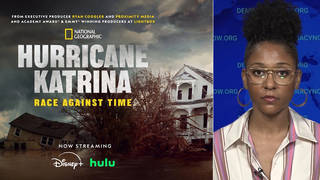
Guests
- Roishetta Sibley Ozanefounder and director of the environmental justice organization The Vessel Project.
In what many are calling a major victory for the climate movement, the Biden administration on Friday paused approvals for new liquified natural gas export terminals. In Louisiana, environmental justice activist Roishetta Sibley Ozane helped push for the change and calls the pause “a monumental decision in the fight for climate justice,” a result of years of organizing by activists and frontline communities. “There is nothing natural about releasing methane pollution into the community where children play.”
Transcript
AMY GOODMAN: This is Democracy Now! I’m Amy Goodman, with Juan González.
In a victory for the climate movement, the Biden administration has paused approvals for new plants to export liquified natural gas. The move comes after years of organizing by activists and frontline communities in Louisiana and other Gulf states, who have decried the LNG terminals as carbon megabombs.
In a statement, President Biden said, quote, “This pause on new LNG approvals sees the climate crisis for what it is: the existential threat of our time. … We will heed the calls of young people and frontline communities who are using their voices to demand action from those with the power to act,” unquote.
Oil Change International called Biden’s decision to pause the gas projects a, quote, “huge win for people and planet.”
Youth activists in Louisiana have been campaigning against the expansion of LNG terminals for years. This is Kami Ozane.
KAMI OZANE: My name is Kami, and I live in Sulphur, Louisiana. Liquefied natural gas being in my community makes me very afraid. We need to step up and protect the Gulf Coast communities by stopping the approval of new and expanded LNG export projects. These facilities are disproportionately and deliberately built in low-income neighborhoods and communities of color.
AMY GOODMAN: We’re joined by Roishetta Ozane, the founder and director of the environmental justice group The Vessel Project of Louisiana. She’s also the mother of Kami, who we just heard in that clip.
Can you respond to this momentous announcement of Biden last Friday, what exactly it means for your community, not to mention the planet?
ROISHETTA SIBLEY OZANE: Thank you so much, Amy, for having me.
The Biden administration made a monumental decision in the fight for climate justice by announcing they are going to pause reviewing applications for new liquefied natural gas export facilities. Now, those facilities are called liquefied natural gas, LNG, facilities, but we know, here in my community, there is nothing natural about releasing methane pollution into the community where children play, where adults are inflicted with things like cancer and asthma and other respiratory conditions. Every day there is flaring. There is some type of release of chemicals. There is noise pollution from the loud flares that come through, sounding like trains. So we are thrilled that the Biden administration listened to the people who are impacted by those decisions, and we’re saying bravo to this administration.
JUAN GONZÁLEZ: And, Roishetta, congratulations on achieving this win. But are you concerned that this is just a pause by the president and could very well be an election year action that he could then reverse later on?
ROISHETTA SIBLEY OZANE: This pause is not just a minor achievement, it is a significant milestone, because it sets the stage for potential rejections and slows down the progress of these projects, making it harder for them to secure financing. It could not have been possible without frontline leadership, but our work is not over, because we are very aware that this is an election year and that this could be, you know, some kind of action to help get voters or encourage young people to vote for this administration, because they told this administration straight out, “If you don’t make a bold move towards climate, then we are not going to vote for you.” So we are aware of it.
But what this has done is opened the door for investigations to see if these projects are in the best interest of the public. Once these reports come out, if frontline leaders, like myself and other frontline community members along the Gulf Coast and in other communities where these projects are overburdenedly located, then they will see that these projects are not in the best interest. Again, out of my six children, two of them have asthma. My sister dealt with cancer. My nephew had cancer. This is not right. Enough is enough. And it doesn’t matter what president comes after. Once we prove that these projects are not in the best interest of the communities, and show the harm that they’re doing, if they listen to science and look at facts and data and still allow these projects to come in communities, then it will be even more evident that we have been deemed as sacrifices and that they don’t care about Black, Brown, Indigenous and low-income people in this country.
AMY GOODMAN: Well, Roishetta Ozane, we thank you so much for being with us, founder and director of the environmental justice group The Vessel Project of Louisiana.












Media Options